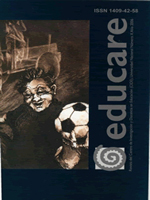El ejercicio del liderazgo y su relación con la Inteligencia Emocional en la Administración Educativa
DOI:
https://doi.org/10.15359/ree.10-1.4Keywords:
emotional intelligence, leadership, school administrationAbstract
This article addresses the definition of some of the key elements of leadership. It also deals with research on the issue and its impact in the management of institutions. Additionally there is a discussion concerning the emotional intelligence, relating these concepts to the tasks of education.
References
Coleman, D. (1999). La Inteligencia Emocional. Buenos Aires: Editorial Javier Vergara.
Dilts, R. ( 1998). Liderazgo creativo, programación neurolingüística. (Segunda Edición). Barcelona: Urano.
Fischam, D. (2002). El camino del líder. México D. F.: Editorial Aguilar.
Herrera, J. (2004). "Inteligencia emocional". Jordanherrera79@hotmail.com. Valencia Venezuela.
Reigh, E. (2004). Liderazgo Emocionalmente Inteligente. México: Me Graw Hill.
Vargas, l. (2003). "Teorías Esenciales del liderazgo". En: Revista Umbral, I Semestre,N° XV, mayo de 2003. 19-23.
Vargas, l. (2005). "Liderazgo emocionalmente inteligente, rol del administrador educativo". Primer simposio virtual hacia la administración de la educación que necesita Costa Rica en el siglo XXI. UNED.
Whitaker, P. (1998). Cómo gestionar el cambio en contextos educativos. España: Editorial Narcea.
Published
How to Cite
Issue
Section
License
1. In case the submitted paper is accepted for publication, the author(s) FREELY, COSTLESS, EXCLUSIVELY AND FOR AN INDEFINITE TERM transfer copyrights and patrimonial rights to Universidad Nacional (UNA, Costa Rica). For more details check the Originality Statement and Copyright Transfer Agreement
2. REUTILIZATION RIGHTS: UNA authorizes authors to use, for any purpose (among them selfarchiving or autoarchiving) and to publish in the Internet in any electronic site, the paper´'s final version, both approved and published (post print), as long as it is done with a non commercial purpose, does not generate derivates without previous consentment and recognizes both publisher's name and authorship.
3. The submission and possible publication of the paper in the Educare Electronic Journal is ruled by the Journal’s editorial policies, the institutional rules of Universidad Nacional and the laws of the Republic of Costa Rica. Additionally, any possible difference of opinion or future dispute shall be settled in accordance with the mechanisms of Alternative Dispute Resolution and the Costa Rican Jurisdiction.
4. In all cases, it is understood that the opinions issued are those of the authors and do not necessarily reflect the position and opinion of Educare, CIDE or Universidad Nacional, Costa Rica. It is also understood that, in the exercise of academic freedom, the authors have carried out a rogorous scientific-academic process of research, reflection and argumentation thar lays within the thematic scope of interest of the Journal.
5. The papers published by Educare Electronic Journal use a Creative Commons License:















 The articles published by Educare Electronic Journal can be shared with a Creative Commons License:
The articles published by Educare Electronic Journal can be shared with a Creative Commons License: 



